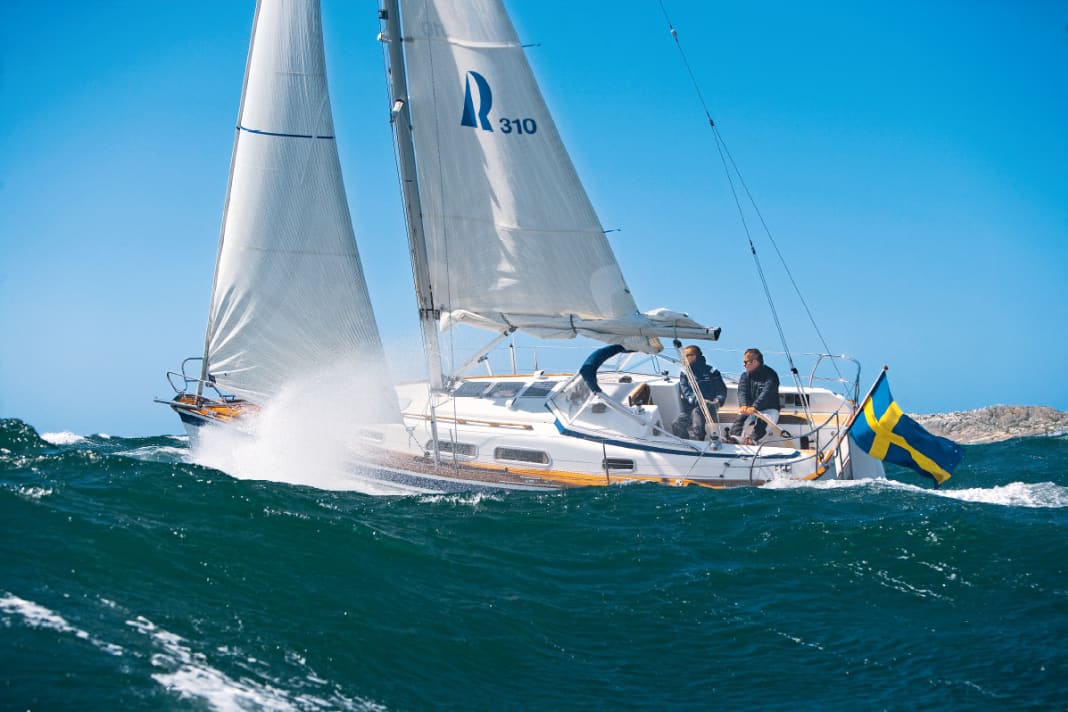Trump tariffs: The US market is collapsing for European shipyards Hallberg-Rassy cuts a third of jobs
Hauke Schmidt
· 09.04.2025




- Trump tariffs have a dramatic impact on the US market
- Sector-wide impact
- The US market is less important for Bavaria and Hanse
- Tax havens as a loophole against Trump
- Sirius benefits from long delivery times
- Motorboat specialist Frauscher: "All orders are on hold"
- Tariffs also affect the US boat industry
Update 10 April 2025: The tariffs of 34 per cent for the EU were suspended by the Trump administration for 90 days; a flat rate of 10 per cent currently applies. This does not change the following statements, particularly with regard to the great uncertainty among manufacturers.
The effects of the import tariffs imposed by US President Donald Trump are now also affecting the renowned Swedish shipyard Hallberg-Rassy. The company is forced to lay off a third of its 194 employees. Managing Director Magnus Rassy cites a combination of the US tariffs, inflation and the weakness of the US dollar as the reasons. The crisis at Hallberg-Rassy is symptomatic of the challenges currently facing the entire European boat industry.
Trump tariffs have a dramatic impact on the US market
"President Trump's tariffs are also hitting us hard, as the USA is our largest single market. His tariffs are paralysing the market, not just for us, but for everyone who exports to the United States, and that has consequences for the whole world. For a Hallberg-Rassy buyer from the USA, the price will rise by 34 per cent if the boat is to be delivered there," Magnus Rassy told the Swedish newspaper ST-Tidningen. The shipyard, which has so far been able to maintain production at full capacity, is now forced to reduce production to 62 per cent. This also means massive job cuts. Around one in three of the 194 employees will have to go.
Despite these cuts, Magnus Rassy is cautiously optimistic about the future. The company is debt-free, has low fixed costs and has many years of experience in adapting to market changes.
Sector-wide impact
The problem is not limited to Hallberg-Rassy alone. The European Boating Industry (EBI), the umbrella organisation of the European boating industry, warns of the far-reaching consequences of Trump's tariffs. In a statement on 3 April, the EBI emphasised that tariffs are a burden on companies, inhibit economic growth and, in particular, endanger jobs in small and medium-sized enterprises, which form the backbone of the boating industry. The ECI welcomes the EU's goal of finding a negotiated solution with the USA and is prepared to put forward proposals to promote the mutual success of the recreational boating industry. The association believes that a permanent elimination of tariffs would support economic growth, jobs and investment on both sides of the Atlantic.
The US market is less important for Bavaria and Hanse
While Hallberg-Rassy has been hit particularly hard, the picture at German shipyards is more differentiated. Marcus Schlichting from Bavaria Yachts explains: "The share of our US business is relatively small in relation to our sales in Europe. And the actual amount of the tariffs imposed by Trump on boat exports to the USA is not yet fixed in the long term." Schlichting sees the greater danger in the general uncertainty: "Much worse is the uncertainty that is now being exacerbated by the discussions about tariffs among European customers. Investments in the private sector in particular, and yachts are nothing else, are being postponed and are putting a strain on our business."
Hanse Yachts takes a similar view. The Greifswald-based company is affected with its Hanse, Dehler and Moody sailing boat brands as well as its Fjord motorboats. They doubt that the tariffs will last long. They are relying on the EU's negotiating skills and have not yet lost any customers, according to a member of the sales team.
Tax havens as a loophole against Trump
"The tariffs don't really affect us, as many of our boats don't sail under the German or US flag," says Michael Schmidt, founder of YYachts. YYachts builds yachts between 70 and 90 feet in length, with a 60-foot model in the pipeline. In general, shipyards specialising in superyachts are less affected, as their customers rarely sail their yachts under the American flag.
Models from YYachts
Sirius benefits from long delivery times
"The majority of our current customers are directly affected and so we are keeping a close eye on developments. In October, we will be exhibiting at the Annapolis Boat Show in the 'sailing mecca' of the East Coast," explains shipyard boss Torsten Schmidt. The shipyard from Plön currently sells around 80 per cent of its yachts abroad. Owners from the USA have accounted for a particularly large proportion of this so far. In 2026, the entire production of the Sirius 35 DS will go to customers in the USA and Canada. "Nevertheless, we are of the opinion that the new development is more of a temporary disruption, as there is no discernible long-term benefit for either side. However, the uncertainty on the market and in global politics and the weakened stock markets are not good for the European market either," says Schmidt.
Schmidt sees an advantage in the high capacity utilisation and the traditionally long delivery times of two to three years associated with this: "We are generally not affected by short-term slowdowns". Overall, he is confident about the future: "With our high-quality deck saloon yachts, we fill a niche for which there is no competition in the USA anyway." The customs surcharge does not seem to play a role here. In addition, his customers often have the opportunity to avoid importing their yachts into the USA for a while, as most owners from the USA do not import their yachts directly after completion, but take them over in the Baltic Sea and sail them home on their own keel via the Canary Islands and the Caribbean.
Motorboat specialist Frauscher: "All orders are on hold"
"The US tariffs are currently having a strong impact on our activities in the USA. Most orders are currently set to "hold". Above all, the uncertainty as to whether these tariffs will remain in place or whether there will soon be an agreement between the EU and the USA is paralysing any future orders for the moment. Our American partners do not want to order boats with customs duties now, as there is a possibility that these duties will soon be reduced again. The next few months will hopefully provide clarity on this and then we expect the situation to ease, says Managing Director Stefan Frauscher. "Our options for reacting to the American tariffs are limited. However, we are in the fortunate position of having a strong domestic market in the EU. We also have new, well-functioning markets such as Turkey and Canada. The fact that we offer two different product lines, motorised and electric boats, is also having a positive impact, especially now in challenging times," Frauscher continues.
Tariffs also affect the US boat industry
The effects of President Trump's trade policy are also evident in the USA itself. According to a survey of US boat manufacturers conducted by the National Marine Manufacturers Association (NMMA), 93% of respondents believe that the tariffs on aluminium and steel will have a negative impact on their business. Manufacturers report rising costs, delivery delays and difficulties in procuring materials.
Uncertainty about future trade relations and possible further tariffs is weighing on companies' planning security. Many US manufacturers fear that the rising costs will ultimately have to be passed on to consumers, which could lead to a decline in demand.
More on Donald Trump:
More about Hallberg Rassy:

Hauke Schmidt
Test & Technology editor
Hauke Schmidt was born in Hanau, Hesse, in 1974, but moved to the coast at the age of an Opti and grew up sailing dinghies and tall ships. School and semester breaks were used for extensive Baltic Sea cruises. During and after his oceanography studies in Kiel, he took part in various international research trips to tropical and polar regions. The focus was on ocean currents and their influence on climate change. Eventually he was drawn back to his home coast and to YACHT. He completed a traineeship there and has been working as an editor in the Test & Technology department since 2009. His core tasks include equipment and boat testing, as well as practical topics relating to electronics, seamanship and refits. As a passionate DIY enthusiast, he loves to spend his summers on the water with his family and winters working on his boat

